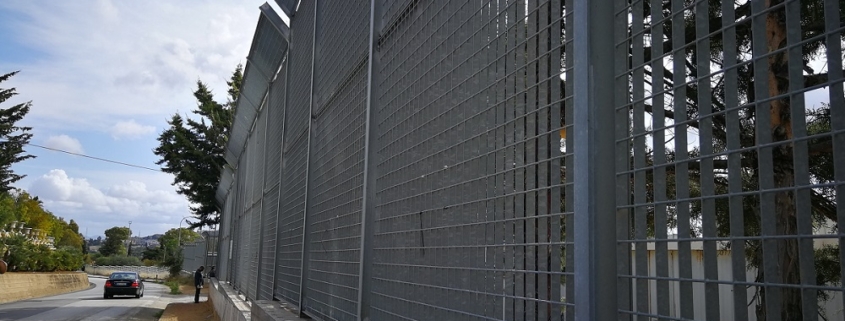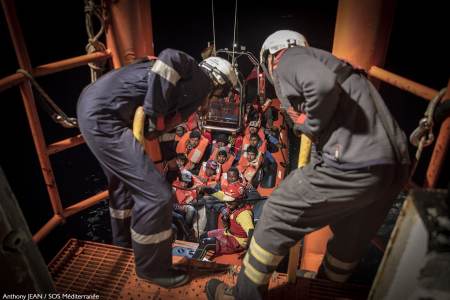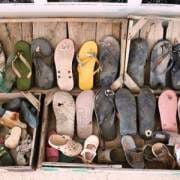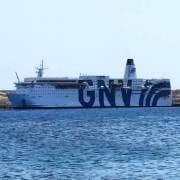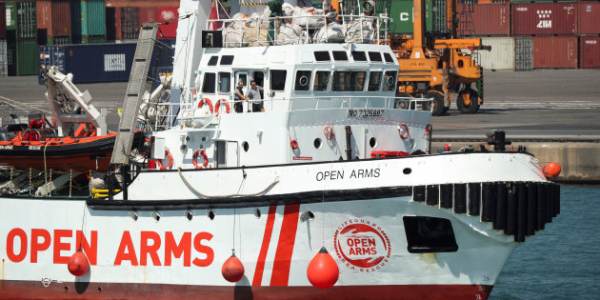Quarantined migrants and unequal lives
Article first published on November 18, 2020
Migrants arriving in Europe are familiar with the meaning of borders. Furthermore, with the control and repression policies which are provided. In times of a pandemic, confinement has a further connotation by also touching health concerns: measures preventing the Covid-19 pandemic lead to long and arbitrary segregations that once again make the migrant body a battleground, dominated by policies of denial of life. Today structural violence against migrants is being redefined in spaces and times of a state of health emergency: in Sicily ships and quarantine centers are being used as hotspot platforms and pre-repatriation facilities. And migrants, in the name of health, are once again reduced to expendable lives and bodies to be selected or rejected.
Exclusion and segregation in times of a pandemic
With the decree of the Head of the Civil Protection Department of 12 April 2020 – which is valid for the whole duration of the Covid-19 health emergency – the organizational measures and procedures to provide healthcare for people who have been rescued at sea have been identified. These include the establishment of places where they shall spend the quarantine specified by national regulations, also inside vessels. These emergency measures incorporate health control through confinement in quarantine centers – either in GNV* ships, CAS*, CARA*, hotspots, or other reception or detention centers in Sicily and Italy. Migrants have to spend the quarantine there, for a time that we know regularly exceeds 15 days, currently reduced to 10, required by law.
Therefore, the detainment in quara2ntine ships and centers represents an act of exclusion of the migrant’s body, placed in an external place – mostly in the middle of the sea – for the matter of “safeguarding public health”.
In this sense, although the quarantines are legitimate devices in order to prevent contagion and protect the public health, they result in discrimination because in this form and time periods they are only applied to migrants: during the previous summer, migrants arriving on Lampedusa and Sicily were systematically tested and quarantined, whereas for foreign tourists none of those measures where applied. These measures are therefore devices depriving individuals of their personal freedom, which clearly differ from the measures that foreign citizens, who arrive in Italy by other ways, have been subjected to.
Not only that, during the past weeks, transfers of asylum seekers from some CAS in Rome where they lived – already part of the local social environment – to some ships off Palermo, Bari, and Trapani have been documented. There they had to carry out the quarantine after receiving positive results. These were illegal practices involving the forced displacement of people from the areas where they were living, the loss of their places in the CAS, and their removal from police headquarters during the asylum application process.
The anti-contagion and virus containment measures have become a discriminatory tool that has led to the creation of ghettos which isolate people who have just arrived in Italy or are already resident, often without guaranteeing the protection of human rights.
Quarantine or hotspot approach?
From a political point of view, quarantine ships and quarantine centers are further tools to implement policies for the selection and rejection of migrants.
In fact, they seem to be used as “floating hotspots” – that means, platforms at sea to make arbitrary and preventive selection between asylum seekers and economic migrants – and as CPRs* to arrange airport transfers and subsequent returns.
Symbolic are the cases of migrants of Tunisian nationality, whose returns – regulated by recent agreements between Italy and Tunisia – have increased by up to three regular departures a week. These procedures systematically provide for the removal of persons through rejections and deportations. The latest in a long series, the repatriation on November 3rd, affected 40 Tunisian migrants who were onboard the Rapsody ship and were transferred to the CPR in Gradisca without any access to legal protection.
In numerous cases, migrants were forced to undergo quarantine for up to months – despite negative swab results – followed by repatriation without the possibility to express and declare their request for international protection.
This condition of abuse is intensified and consolidated by the systematic lack of legal and social information, the failure to identify vulnerable people and minors, the state of abandonment to which migrants are left suffering serious violations of their freedom and rights.
Criticism regarding quarantine ships and Covid centers in Sicily
The GNV ships arranged by the government for the quarantine of migrants are the Adriatic, the Allegra, the Rhapsody, the Azzurra, the Suprema, and the Aurelia, operating in an expensive rotation between the ports of Lampedusa, Porto Empedocle, Palermo, Augusta, and Trapani, carrying people from one port to another. They act as health facilities where the Italian Red Cross is responsible for health care measures, cultural-linguistic mediation, psychological support, and identification of vulnerabilities.
In the quarantine centers on land, the situation is very critical, with little personnel at work and police forces to guard the spaces. Severe episodes of physical violence against detainees have been reported, as well as the confiscation of personal belongings.
In general, the conditions emerging from the quarantine ships and Covid centers located in Sicily report that these centers substantially do not preserve the health of migrants, staff, and other individuals.
In fact, from a health point of view, in most of the cases, these places do not allow the total respect of the anti-Covid norms. They do not guarantee social distancing or the isolation of virus positive individuals – who very often live in the same areas as the negatives – and they do not ensure a thorough medical and psychological assistance.
In addition, we have found that quarantines are extended even when the swab is repeatedly negative, turning into unjustified detention. In particular, in the so-called “Covid area” in the CARA of Pian del Lago in Caltanissetta, quarantines last for months. Here hygienic conditions are poor and for a period of time migrants were forced to sleep on mattresses in the outdoor areas, in total health insecurity and promiscuity.
Because of these conditions, there have been numerous suicide attempts by people detained in Covid centers.
Not only that, during these months the ships and centers have welcomed thousands of minors, families, and women among whom we have noted people with significant medical conditions – such as diabetes, heart problems, disabilities – or serious health conditions not related to the virus contraction – such as torture and physical abuse – that are not investigated and in more than one case have caused the worsening of health conditions if not the death of the affected people.
To Suffer and to die in quarantine: Bilal, Anwar, Abou, Abdallah
So far, the quarantine centers are linked to the death of four people:
Last May Bilal Ben Messaud, a 22-year-old Tunisian, jumped from the quarantine ship Moby Zazà – offshore Porto Empedocle – after days and days of an extended period on the ship, despite the negative Covid-19 swabs. The exasperation of an unreasonable wait drove him to jump into the water, eager to swim to the mainland.
Anwar Sied, a 20-year-old Eritrean, died during a protest in the center of Villa Sikania, in Siculiana, as a reaction to a continuing quarantine that had caused extreme distress: while running away from the center he was hit by a car in the middle of the night.
Abou Dakite, a 15-year-old Ivorian, was – together with 200 other shipwrecked people – rescued at sea by the ship Open Arms last September. He died at the Cervello hospital in Palermo, after being quarantined on the Allegra ship. The boy had been reporting a serious discomfort for days and apparently did not receive the necessary health care.
Abdallah Said, a minor from Somalia, died on 15 September at the Cannizzaro hospital in Catania, after being confined on the quarantine ship Azzurra, located in Augusta. Abdallah suffered from tuberculosis and his condition worsened on the ship that was meant to protect and treat him until he died of encephalitis in Catania.
The death of Abdallah is still being investigated under the guidance of the child’s guardian and his lawyer. This death, as well as Abou’s death, represents an unacceptable precedent for the protection of unaccompanied foreign minors in times of a pandemic.
On the basis of the violence suffered by Abou in October, a complaint was filed at the Juvenile Prosecutors’ Offices of Palermo and Catania by various associations that requested the immediate removal of unaccompanied foreign minors from the quarantine ships, as they are unsuitable places for the protection of minors. The associations denounced the abuses on those individuals and continued the campaign demanding truth and justice on their disappearance, as well as the provision of immediate disembarkation of the minors present on the quarantine ships.
As a result of this complaint, on 4 November, about 100 unaccompanied minors were taken on the liner Cossyra to Porto Empedocle and transferred to Covid centers in Agrigento and other provinces – which will probably become Covid centers for minors – where they will be assigned local mayors as guardians.
Combats for the health and life of migrants
The experience of alienation and humiliation that migrants have to endure at the borders of Europe and in the country of arrival is inseparable from the struggles for the recognition of their rights. In fact, among the national organizational measures, containment measures, illegitimate and repressive practices, the protest acts of migrants are embedded: in these normalized routines, the migrant’s presence – which incorporates the structural violence of detention – is put into play up to extreme practices such as self-harm.
Two weeks ago, nine migrants swallowed razor blades in order to protest against the prolonged detention conditions on the Rhapsody ship in Palermo.
A week earlier, some migrants who were detained in the Covid area of Pian del Lago in Caltanissetta organized yet another protest against the prolonged detainment, climbing on the roofs of the facility. Already in the previous weeks, different forms of protests had been recorded, where video testimonies were broadcasted by the migrants themselves and by the solidarity associations on social channels.
All over Sicily, we know that protests, fires, fasting, acts of self-harm, spreading of statements, and migrant strikes in quarantine centers and on quarantine ships have been going on for months. The demands are to obtain health protection, to separate the infected people from non-infected ones, to gain access to medical treatment for prior diseases, to be able to register the request for asylum, to end illegitimately long detention, and finally not to be repatriated. It is the migrants themselves – together with external activists and supporters – who stress and fight for their presence, with physical actions rooted in structural violence.
Unequal lives
From the rescue at sea to the landing, from being confined in quarantine ships off Sicily to returning to land, the Mediterranean border moves from sea to land and from land to sea.
And so, it imposes prolonged detainment, repatriation, and detentions, whose purpose goes far beyond the health management of the virus. In this scenario, the right to life and health varies according to nationality and origin, establishing unequal access to treatment among those born in the south or north of the Mediterranean.
In fact, it is dramatic to see how the value of the right to health and life in the abstract sense – as a fundamental good – does not prevent the unequal valuation of actual lives: how can the national and international obligation to protect human lives in times of a pandemic match with the exposure of survivors of sea crossings with health threats and the risk of death, in the name of the protection of “public health”?
“We are a species that is disappearing”, said N., a migrant quarantined in Pian del Lago for about a month, among companions who attempted suicide while living in situations of deep suffering. A “species” – or rather, a social group – that lives in conditions of oppression and repeated violence, in a system of biopolitical management of human bodies that last during the whole migration process: from the violence suffered in third countries to the abandonment at sea due to the blockade of humanitarian ships, to the shipwrecks that continue non-stop in the Mediterranean Sea and the exposure to distress and death in the quarantine centers.
In times of pandemic, it is even more evident how biopolitical governance is equivalent to the power of defining who matters and who does not, who has a sacrificial life and who is scared: therefore, the principle of protection of human life is not applied to the lives of migrants – invisible, shipwrecked or disintegrated – who continue to survive in floating grey areas.
The violence against migrants in the centers and the death of people like Bilal, Abou, Abdallah, and Anwar – produced by these policies – are intolerable.
We continue to demand protection of rights – the right to health, legal protection, the possibility to seek asylum. We call for an end of systematic returns and the use of ships and quarantine centers as hotspots where migrants can be “selected”. Demanding verification of the legitimacy of restrictive measures against people placed on ships and in quarantine centers – adults, minors, unaccompanied minors.
To urge that, on land and at sea, the logic of hierarchy of lives does not prevail, but the unconditional care of all.
Because the lives of migrants matter.
Silvia Di Meo
Borderline Sicilia
*CAS: Centro di accoglienza straordinaria – Extraordinary reception center
*CARA: Centro di accoglienza per richiedenti asilo – Reception center for asylum seeker
*CPR: Centro di permanenza per il rimpatrio – Detention and repatriation center
*GNV: “Grandi navi veloci”, Italian shipping company
Translated from Italian by Clara-Marie Pache

